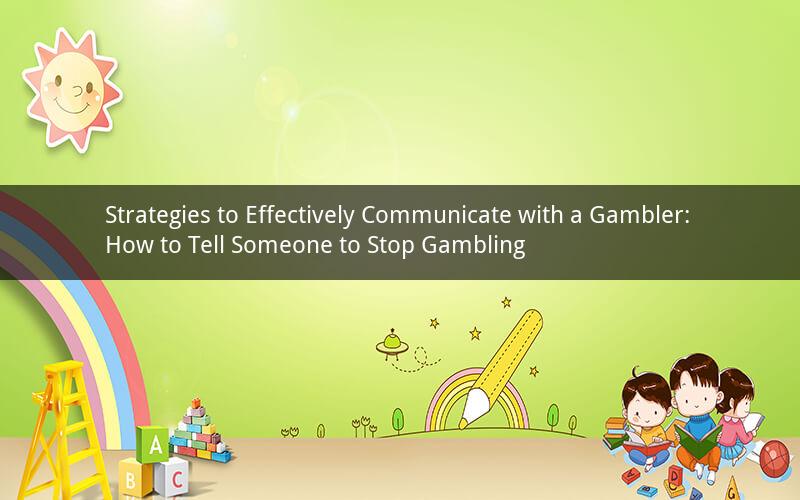
Introduction:
Gambling addiction is a serious issue that affects millions of individuals worldwide. If you know someone who is struggling with gambling, it can be challenging to approach the topic and encourage them to seek help. This article provides practical strategies on how to effectively communicate with a gambler and tell them to stop gambling.
1. Understand the Problem:
Before you can help someone overcome their gambling addiction, it's essential to understand the problem. Educate yourself about gambling addiction, its symptoms, and the potential consequences. This knowledge will enable you to empathize with the gambler and approach the conversation with sensitivity.
2. Choose the Right Time and Place:
Timing is crucial when discussing sensitive topics like gambling addiction. Choose a moment when the person is calm and not under the influence of alcohol or drugs. Find a private and comfortable place where they won't feel threatened or judged.
3. Use "I" Statements:
When addressing the issue, it's important to use "I" statements to express your concerns without sounding accusatory. For example, instead of saying, "You're a problem gambler," say, "I'm worried about your gambling habits and how it's affecting you."
4. Express Your Concerns Clearly:
Be specific about the concerns you have regarding the person's gambling behavior. Use examples to illustrate your points. For instance, "I noticed that you've been spending a lot of time at the casino lately, and it's causing financial stress in our household."
5. Show Empathy and Support:
Let the person know that you care about their well-being and want to help them overcome their addiction. Avoid judgment and focus on offering support. Say something like, "I understand that this is a difficult issue for you, but I'm here to support you through this journey."
6. Encourage Professional Help:
Encourage the person to seek professional help from a therapist or counselor specializing in gambling addiction. Provide them with information about local resources and support groups. Assure them that seeking help is a sign of strength, not weakness.
7. Set Boundaries:
If the person's gambling habits are causing harm to you or others, it's important to set boundaries. Clearly communicate your limits and the consequences of their behavior. For example, "I can't afford to lend you money for gambling, and I need you to stop gambling to improve our financial situation."
8. Be Patient and Persistent:
Overcoming a gambling addiction is a challenging process that requires time and patience. Be prepared for setbacks and understand that recovery may take time. Continue to offer support and encouragement throughout the journey.
9. Educate Yourself About Recovery:
Learn about the recovery process and the different treatment options available. This knowledge will enable you to better support the person as they work towards overcoming their addiction.
10. Stay Informed:
Keep up-to-date with the latest research and resources on gambling addiction. This will help you provide the most accurate and helpful information to the person you're supporting.
Questions and Answers:
Q1: How can I approach the conversation without causing the person to become defensive?
A1: Use "I" statements to express your concerns, focus on your feelings rather than指责, and be empathetic in your approach.
Q2: What if the person denies that they have a gambling problem?
A2: Continue to express your concerns and offer support. Avoid arguing or getting frustrated. Instead, encourage them to seek professional help to address their denial.
Q3: How can I help the person find a therapist or counselor specializing in gambling addiction?
A3: Research local resources and support groups, provide them with contact information, and offer to accompany them to their first appointment if they feel comfortable.
Q4: What should I do if the person's gambling addiction is causing financial hardship for me or my family?
A4: Set clear boundaries and communicate your limits. Consider seeking financial counseling or legal advice to protect yourself and your family.
Q5: How can I maintain my support for the person while also taking care of myself?
A5: Set aside time for self-care and seek support from friends, family, or support groups. Remember that taking care of yourself is crucial for maintaining your well-being and being able to provide consistent support to the person you're helping.